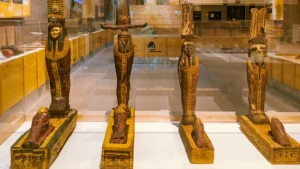A Journey Through The Nubian Museum
The Nubian Museum: A Journey Through Nubian Heritage
Nestled in the heart of Aswan, the Nubian Museum is a treasure trove of history, culture, and art. This remarkable institution provides a deep dive into the rich and diverse heritage of the Nubian people,
whose history stretches back thousands of years. Whether you’re a history enthusiast, an art lover, or simply curious about different cultures, the Nubian Museum offers an engaging and educational experience.
1. Introduction to Nubian Culture
Nubia, located in the region along the Nile in southern Egypt and northern Sudan, has a rich history that dates back to ancient times.
- Historical Significance: Nubia was home to some of Africa’s earliest civilizations and played a crucial role in the history of ancient Egypt.
- Cultural Diversity: The Nubian people have a unique cultural identity, influenced by a blend of African, Egyptian, and Arab traditions.
- Resilience: Despite numerous challenges, including displacement due to the construction of the Aswan High Dam, the Nubian people have preserved their cultural heritage.
2. The Nubian Museum Architecture and Design
The Nubian Museum, opened in 1997, is an architectural marvel in itself, designed to reflect Nubian heritage and the natural environment of Aswan.
- Architectural Style: The museum’s design incorporates elements of traditional Nubian architecture, blending seamlessly with the surrounding landscape.
- Natural Integration: The use of local materials and the incorporation of gardens and water features create a harmonious and inviting atmosphere.
- Interactive Spaces: The museum features interactive spaces and exhibits that engage visitors of all ages.
3. Exploring the Exhibits of Nubian Museum: A Walk Through History
The Nubian Museum’s exhibits are meticulously curated to provide a comprehensive overview of Nubian history and culture.
-
- Ancient Artifacts: The museum houses over 3,000 artifacts, including pottery, jewelry, and statues that date back to prehistoric times.

- Pharaonic Period: Discover the influence of ancient Egypt on Nubian culture through exhibits showcasing artifacts from the Pharaonic period.
- Christian Nubia: Learn about the Christian period in Nubian history, marked by the construction of churches and the spread of Christianity.
- Islamic Influence: Explore the impact of Islam on Nubian culture, including changes in architecture, art, and daily life.
4. The Nubian Experience: Interactive and Educational
The Nubian Museum offers a range of interactive and educational experiences that bring Nubian culture to life.
- Multimedia Presentations: Enjoy multimedia presentations that provide an immersive experience of Nubian history and traditions.
- Hands-On Activities: Participate in hands-on activities such as pottery making and traditional Nubian crafts.
- Educational Programs: The museum offers educational programs and workshops for children and adults, fostering a deeper understanding of Nubian heritage.
5. The Nubian Museum Gardens: A Serene Oasis
The Nubian Museum’s gardens are a tranquil retreat, offering a peaceful space to relax and reflect.
- Botanical Beauty: Stroll through the beautifully landscaped gardens, featuring a variety of native plants and trees.
- Cultural Displays: The gardens include replicas of traditional Nubian houses and architectural features, providing insight into Nubian life.
- Relaxation Areas: Enjoy shaded seating areas and water features that create a serene and calming environment.
6. The Nubian Village Aswan: A Living Heritage
Adjacent to the museum, the Nubian Village offers a glimpse into contemporary Nubian life and culture.
- Traditional Houses: Visit traditional Nubian houses, characterized by their vibrant colors and unique architectural style.
- Local Crafts: Explore stalls and shops selling handmade Nubian crafts, including textiles, jewelry, and pottery.
- Cultural Performances: Experience live cultural performances, including traditional Nubian music and dance.
7. Preservation and Conservation Efforts
The Nubian Museum plays a crucial role in preserving and conserving Nubian heritage.
- Artifact Conservation: The museum is dedicated to the conservation and restoration of Nubian artifacts, ensuring their preservation for future generations.
- Cultural Documentation: The museum documents and archives Nubian cultural practices, traditions, and oral histories.
- Community Engagement: The museum actively engages with the Nubian community, supporting initiatives that promote cultural preservation and education.
8. Visitor Experience: What to Expect
A visit to the Nubian Museum is a rewarding and enriching experience for all visitors.
- Guided Tours: Knowledgeable guides are available to provide in-depth tours and answer questions about the exhibits and Nubian culture.
- Accessibility: The museum is easily accessible and equipped with facilities to accommodate visitors with disabilities.
- Photography: The museum offers excellent opportunities for photography, capturing the beauty and intricacy of Nubian art and culture.
9. Connecting with Nubian Heritage: A Personal Reflection
Visiting the Nubian Museum is more than just a cultural experience; it’s a journey of connection and reflection.
- Cultural Appreciation: Gain a deeper appreciation for the resilience and creativity of the Nubian people.
- Historical Insight: Understand the historical significance of Nubia and its impact on the broader history of Egypt and Africa.
- Inspiration: Be inspired by the beauty and richness of Nubian culture, and consider how cultural heritage shapes our identities and communities.
Finally
The Nubian Museum in Aswan is a must-visit destination for anyone interested in exploring the rich and diverse heritage of the Nubian people. From its meticulously curated exhibits to its serene gardens and interactive experiences, the museum offers a comprehensive and engaging journey through Nubian history and culture. So, when you find yourself in Aswan, make sure to set aside time to visit the Nubian Museum and immerse yourself in the fascinating world of Nubian heritage.








